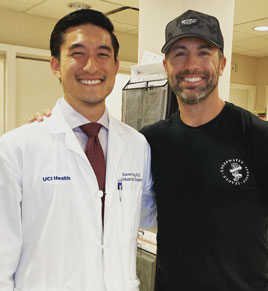
Torn Meniscus
The orthopaedic specialists at UCI Health provide surgical and nonsurgical treatment and recovery options for patients suffering from a torn meniscus.
At UCI Health, our orthopaedic specialists are here to get you back moving, reduce your pain and improve your overall quality of life.
They will work with you to find the best, most comprehensive treatment plan to repair your torn meniscus, including both surgical and non-surgical options.
Meniscus tear symptoms
When the meniscus tears, you may hear or feel a popping sound. Other symptoms include:
- Pain in the knee
- Swelling
- Locking of the knee
- Limited range of motion

Don’t let a torn meniscus sideline you.
Get back to an active, pain-free lifestyle.
Call 714-456-7012 today to schedule an appointment or

Find an orthopaedics clinical trial
Talk to your doctor to see if a orthopaedics clinical trial is right for you.
Featured Blog Posts

Live Well’s most popular stories of 2023
Take a peek at our readers' favorite articles of the year.

Partial knee replacement revitalizes life of Marine

Living full throttle after hip replacement surgery
After being told he was too young for hip surgery and advised to get a knee replacement instead, 55-year-old retired Marine Corps officer Scott Shuster sought a second opinion at UCI Health.
Testing for torn meniscus
If you are experiencing torn meniscus symptoms, the first step is to schedule an appointment with a UCI Health orthopaedic specialist. They will perform tests to determine if you have a torn meniscus.
The most common test for a meniscal tear is the McMurray test. During this test, your doctor will bend your knee, straighten and rotate it. If there is a tear, your knee will make a clicking sound.
Your doctor may also order imaging tests, such as X-rays or MRI, to get a better look.
Treatment for torn meniscus
You may not need meniscus surgery. Depending on the severity of your tear, your orthopedic surgeon will guide you in choosing the best treatment, whether surgical or non-surgical.Non-surgical meniscus tear treatment
Most meniscal tears are helped by the RICE protocol:
- Rest
- Ice
- Compression
- Elevation
Other non-surgical treatments include platelet-rich-plasma and other biologic injections.
Meniscus tear surgery
Your doctor may recommend arthroscopic surgery if your symptoms don't improve with the RICE protocol.
During arthroscopic surgery, a small incision is made in your knee. A miniature camera is inserted to give your surgeon a clear view of the inside of your knee. Once the problem is identified, your surgeon will use small surgical instruments to repair the meniscus.
Your doctor may recommend physical therapy as part of your recovery after surgery.
Why choose UCI Health for torn meniscus care?
Personalized treatment approach
Not all meniscus tears are equal. At UCI Health we treat you as an individual, utilizing both surgical and non-surgical treatment options.
New state-of-the-art surgical facilities
Our facilities offer leading edge resources to provide comfortable and minimally invasive technology.
Only academic medical center in Orange County
This means we are at the forefront using the latest technologies which mean easier and faster recovery for you.
Causes of torn meniscus
Although meniscal tears can happen to anyone, you are at higher risk if you are an athlete or an older adult with weakened and worn cartilage. Any awkward movement, no matter how simple, can lead to a meniscus tear.If the meniscal tear is untreated, cartilage may break off and move into the joint, causing the knee to lock.
Upcoming Events
12-1 p.m. +6 more dates




